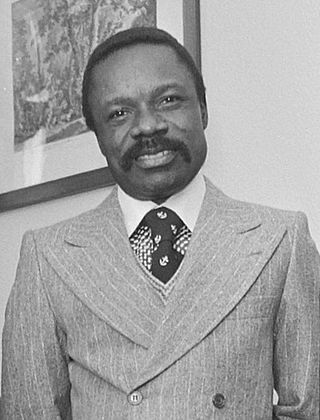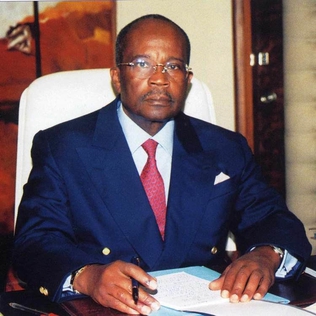
Gabon, officially the Gabonese Republic, is a country on the west coast of Central Africa. Located on the equator, it is bordered by Equatorial Guinea to the northwest, Cameroon to the north, the Republic of the Congo on the east and south, and the Gulf of Guinea to the west. It has an area of nearly 270,000 square kilometres (100,000 sq mi) and its population is estimated at 2.3 million people. There are coastal plains, mountains, and a savanna in the east.
Little is known of the history of Gabon prior to European contact. Bantu migrants settled the area beginning in the 14th century. Portuguese explorers and traders arrived in the area in the late 15th century. The coast subsequently became a center of the transatlantic slave trade with European slave traders arriving to the region in the 16th century. In 1839 and 1841, France established a protectorate over the coast. In 1849, captives released from a captured slave ship founded Libreville. In 1862–1887, France expanded its control including the interior of the state, and took full sovereignty. In 1910 Gabon became part of French Equatorial Africa and in 1960, Gabon became independent.

El Hadj Omar Bongo Ondimba was a Gabonese politician who was the second President of Gabon for 42 years, from 1967 until his death in 2009. Omar Bongo was promoted to key positions as a young official under Gabon's first President Léon M'ba in the 1960s, before being elected Vice-President in his own right in 1966. In 1967, he succeeded M'ba to become the second Gabon President, upon the latter's death.
Jean-François Ntoutoume Emane is a Gabonese politician who was Prime Minister of Gabon from 23 January 1999 to 20 January 2006. He was Mayor of Libreville, the capital, from 2008 to 2014.

Ali Bongo Ondimba, sometimes known as Ali Bongo, is a Gabonese politician who is the third and current president of Gabon since October 2009.

Jean Eyeghé Ndong is a Gabonese politician. He was the Prime Minister of Gabon from January 20, 2006 to July 17, 2009. He was also the First Vice-President of the Gabonese Democratic Party (PDG) until 2009.

Casimir Marie Ange Oyé-Mba was a Gabonese politician. After serving as Governor of the Bank of Central African States (BEAC) from 1978 to 1990, Oyé-Mba was Prime Minister of Gabon from 3 May 1990 to 2 November 1994. Subsequently, he remained in the government as Minister of State for Foreign Affairs from 1994 to 1999, Minister of State for Planning from 1999 to 2007, and Minister of State for Mines and Oil from 2007 to 2009.

Nearly ten percent of the population of Gabon practice Islam, according to a 2012 estimate. Most follow Sunni Islam. 80 to 90 percent of the Muslims are foreigners.
Didjob Divungi Di Ndinge is a Gabonese politician who was Vice-President of Gabon from 1997 to 2009. He is the President of the Democratic and Republican Alliance (ADERE), a political party. As Vice-President of Gabon, Divungi Di Ndinge exercised presidential powers in an acting capacity from May 2009 to June 2009, while President Omar Bongo Ondimba was hospitalized.

Christianity is the predominant religion in Gabon, with significant minorities of the adherents of Islam and traditional faiths.

Presidential elections were held in Gabon on 6 December 1998. Incumbent President Omar Bongo, in power since 1967, sought a seven-year term against five other candidates. It was Gabon's second multi-party presidential election and, despite low turnout and polling problems, Bongo won the election with 66.88% of the vote.
Idriss Ngari is a Gabonese politician and army general. A relative of President Omar Bongo, Ngari rose rapidly through the ranks of the army, ultimately serving as Chief of Staff of the Armed Forces from 1984 to 1994. He then held a succession of posts in the government of Gabon, serving as Minister of Defense from 1994 to 1999, Minister of Transport from 1999 to 2002, Minister of the Interior from 2002 to 2004, Minister of Public Works from 2004 to 2007, Minister of Tourism from 2007 to 2009, and finally as Minister of Health in 2009. Considered one of Gabon's most powerful figures during Omar Bongo's rule, Ngari is a member of the Gabonese Democratic Party (PDG).
André Mba Obame was a Gabonese politician. After serving as an adviser to President Omar Bongo in the 1980s, he was a minister in the government of Gabon from 1990 to 1991 and again from 1997 to 2009; during that time, he was identified with the reformist wing of the ruling Gabonese Democratic Party (PDG). He held the key post of Minister of the Interior from 2006 to 2009 and then briefly served as Minister of the Coordination and Follow-up of Government Action in mid-2009. He was an independent candidate in the 30 August 2009 presidential election and placed third with 25.33% of the vote, according to official results, but he claimed victory and alleged that the PDG candidate, Ali Bongo, won through fraud.
Jean-Boniface Assélé is a Gabonese politician and the President of the Circle of Liberal Reformers (CLR). He served in the government of Gabon from 1975 to 1990 and again from 2004 to 2009. He was also Commander-in-Chief of the National Police Forces from 1970 to 1989 and held the rank of General. Since September 2009, Assélé has been the Fourth Vice-President of the Senate of Gabon.

Édith Lucie Bongo Ondimba was the First Lady of Gabon as the wife of President Omar Bongo from 1989 to 2009.

The second President of Gabon, Omar Bongo, died in Spain on June 8, 2009, after having suffered from colorectal cancer. A month of mourning and state funeral, spanning June 11 to 18th, followed.
Pierre-Claver Zeng Ebome was a Gabonese politician and musician. He held a succession of ministerial portfolios in the government of Gabon during the 1990s and subsequently served as a Deputy in the National Assembly of Gabon. Zeng Ebome was the President of the African Development Movement (MAD), a minor political party, until February 2010, when it merged itself into the National Union; afterward he was briefly a Vice-President of the National Union from February 2010 to May 2010.
Paul Biyoghé Mba is a Gabonese politician who was Prime Minister of Gabon from July 2009 to February 2012. A member of the Gabonese Democratic Party (PDG), he served for years as a minister in the government prior to his appointment as Prime Minister. From 2012 to 2015, he was President of the Economic and Social Council of Gabon, and he has again served in the government as First Deputy Prime Minister for Health since 2015.
This page details the process of qualifying for the 2000 African Cup of Nations.
Events in the year 2009 in Gabon.








